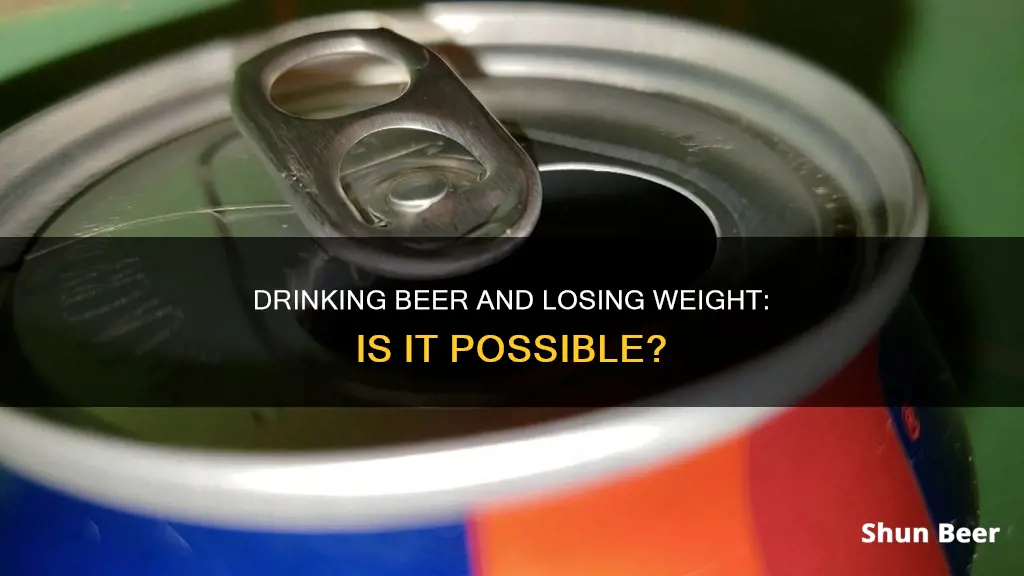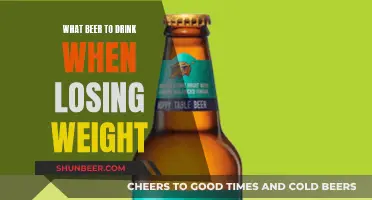
Losing weight while still drinking beer is possible, but it requires dedication and a good understanding of your body's needs. Alcohol is often blamed for weight gain, but it's important to remember that it's not just the beer that leads to those extra pounds; it's also the calorie-rich snacks that tend to go with it. The first step is to understand how alcohol affects your body. When you drink, your body prioritises getting rid of alcohol over burning fat, and this can lead to weight gain. However, this doesn't mean you have to give up beer entirely. Moderation is key. Limit yourself to one or two beers, and make sure you're aware of the calories you're ingesting. You can also try switching to light beers, which have fewer calories and carbohydrates. In addition to monitoring your beer intake, it's important to stay active. High-intensity interval training (HIIT) and heavy resistance training can help increase your body's ability to burn calories, even at rest. Finally, make sure you're drinking plenty of water before, during, and after consuming alcohol to stay hydrated.
| Characteristics | Values |
|---|---|
| Calories in beer | 153 calories per beer (USDA) |
| Calories in craft beer | 171 calories per beer (e.g. Blue Moon) |
| Calories in light beer | 103 calories per beer (USDA) |
| ABV | The higher the ABV, the higher the calories |
| Calories in mixers | 4 oz of daiquiri or margarita mixes can contain 35g of sugar |
| Calories in cocktails | Espresso martini: 300 calories per drink |
| Calories in wine | 120-150 calories per 5 oz pour |
| Calories in spirits | 60-90 calories per 1 oz pour |
| Calories in champagne | 84 calories per 4 oz pour |
| Calories in prosecco | 80 calories per 4 oz pour |
What You'll Learn

Avoid binge drinking
Binge drinking is defined as drinking five or more drinks in a span of about two hours. Even occasional binge drinking can lead to weight gain and increase the risk of obesity. Here are some tips to avoid binge drinking:
- Plan your drinking days: If you plan to go hard on Saturday, account for this earlier in the week. If you estimate drinking 1500 calories in booze, eat around 300 fewer calories each day during the week.
- Avoid consecutive heavy drinking days: If you are serious about losing weight, avoid drinking heavily on two consecutive days.
- Choose low-calorie drinks: Opt for gin and slim or vodka, lime, and soda, which have fewer calories. Alternatively, stick to tequila shots, which are only 69 calories each.
- Drink on an empty stomach: Drinking alcohol on an empty stomach will get you drunk faster, reducing the total number of drinks and calories consumed.
- Drink water: Staying hydrated with water during nights out and parties helps ensure you don't drink more than intended. Alternating each alcoholic beverage with a glass of water also helps pace your drinking.
- Eat before drinking: Eating a nutritious, well-balanced meal before drinking helps pace your drinking and reduces the likelihood of making unhealthy food choices at the bar.
- Opt for lower-calorie drinks: Some of the best alcoholic drink options for weight loss include gin and tonic, white wine, light beers, and lower-ABV cocktails such as Screwdriver, Mimosa, and Paloma.
- Create your own low-calorie cocktails: Swap out high-calorie ingredients in your favourite cocktails with low-calorie alternatives. For example, replace regular Coke with diet Coke or regular tonic water with diet tonic water.
Orthodox Christians: Beer During Fasting, Allowed or Not?
You may want to see also

Avoid binge eating
Binge eating is a common issue that many people face. Here are some tips to avoid binge eating:
Avoid restrictive diets and fasting
Fad diets, fasting, and eliminating entire food groups can trigger binge eating. Instead, focus on making healthy enhancements to your diet. Prioritize whole, unprocessed foods such as fruits, vegetables, and grains. It's okay to indulge in treats now and then, but moderation is key.
Maintain a regular eating schedule
Skipping meals can increase the risk of binge eating. Aim for three meals a day and try to eat at consistent times. Starting your day with a nutritious breakfast that includes protein and fiber can help curb cravings and keep you feeling full.
Stay hydrated
Drinking plenty of water throughout the day can help curb cravings and prevent overeating. Aim to drink water before and with your meals. This can help you feel fuller and reduce your overall calorie intake.
Practice mindfulness and mindful eating
Mindfulness involves listening to your body and paying attention to how you feel. It can help you recognize when you're no longer hungry, so you can stop eating accordingly. Eating slowly and paying attention to each bite can also help you tune into your body's hunger cues.
Increase your fiber and protein intake
Fiber and protein-rich foods can help you feel fuller for longer and reduce cravings. Include fruits, vegetables, legumes, whole grains, meat, eggs, nuts, and seeds in your meals and snacks. This will help you stay satisfied and less likely to binge.
Get enough sleep
Sleep plays a crucial role in regulating hunger and appetite. Lack of sleep can disrupt hormones that control hunger, leading to increased cravings and binge eating. Aim for at least eight hours of sleep per night.
Plan your meals
Meal planning can help ensure you have healthy ingredients on hand and make it easier to stick to a regular eating schedule. It also reduces the likelihood of reaching for less nutritious options or binging on junk food.
Identify emotional triggers
Binge eating is often linked to emotions. Identify the feelings or situations that trigger your urge to binge. Are you more likely to binge when you're angry, frustrated, bored, or celebrating? Once you recognize these triggers, you can develop strategies to cope with them in healthier ways.
Manage stress
Stress is a common trigger for binge eating. Find healthy ways to cope with stress that don't involve food. This could include deep breathing exercises, meditation, yoga, or connecting with loved ones.
Build a support system
Talk to your trusted friends or family members about your struggles with binge eating. Consider joining a support group or seeking therapy to help you manage your emotions and develop healthier coping strategies.
Beer Macros: Why They Fail and How to Fix It
You may want to see also

Drink water before, during, and after
Drinking water before, during, and after consuming beer is an important part of losing weight while still drinking beer. Alcohol is a diuretic, which means that it dehydrates you. This dehydration is part of the reason for hangovers, which can make you want to skip a workout. By drinking water before, during, and after drinking beer, you can avoid this dehydration and the sluggishness that comes with it, making it easier to stick to your workout routine.
Drinking water can also help you reduce the number of beers you drink. If you alternate every alcoholic drink with a glass of water, you may find that you get used to sipping on water and don't feel the need for another beer. This can help you cut back on the alcohol calories you consume.
In addition to drinking water, there are several other strategies you can use to lose weight while still drinking beer. One strategy is to limit the number of beers you drink per week. The fewer beers you drink, the fewer calories you ingest. You could aim for one beer a day or two beers on the weekend. If you want the best results, you could stop drinking beer completely.
Another strategy is to adjust your eating habits based on your drinking habits. Beer provides calories without satisfying your hunger. If you're having a burger and a couple of beers, for example, you could skip the fries. Eating less food and focusing on lean protein sources and vegetables when drinking beer can help you lose weight.
You can also try switching to light or low-percentage ABV beers, which have fewer calories than regular beers. In addition, lower-carb diets are often associated with weight loss, so choosing a lower-carb beer can help.
Beer Drinking and Weight Loss: Is It Possible?
You may want to see also

Pick healthier drink options
Picking healthier drink options is a great way to reduce your caloric intake while still enjoying a drink. Here are some tips to help you choose healthier drinks:
- Opt for light beers: Light beers typically have fewer calories than regular beers. For example, a light beer has around 103 calories, compared to approximately 153 calories in a regular beer.
- Choose lower-ABV beers: Beers with a lower alcohol by volume (ABV) percentage tend to have fewer calories. For instance, Budweiser Select 55 and Corona Premier are lower-carb and lower-ABV options.
- Go for clear spirits: Clear spirits like vodka, gin, and tequila tend to be lower in calories than dark spirits. For example, a 1.5-ounce serving of gin, rum, vodka, or whiskey has about 97 calories.
- Use zero-calorie mixers: When opting for mixed drinks, choose zero-calorie mixers like soda water or sugar-free tonic water. Avoid sugary mixers, as they can contain a significant amount of sugar and calories.
- Select wine over craft beer: A standard 5-ounce glass of wine typically contains around 120 to 150 calories, while a craft beer can have 170 calories or more.
- Try alcohol-free beer: Alcohol-free beer has fewer calories and can help you avoid the negative side effects of alcohol, such as impaired self-control and disrupted sleep.
- Limit portion size: Instead of a 16-ounce bottle, opt for a 12-ounce can or use a smaller glass to reduce your overall consumption and calorie intake.
Non-Alcoholic Beer: Safe to Drink While Driving?
You may want to see also

Eat protein-rich foods
Eating protein-rich foods is a great way to lose weight and still drink beer. Protein promotes a sense of fullness, helping you stick to your diet and avoid overeating. It also helps build muscle and maintain muscle mass.
Meat and Poultry
Meat and poultry are excellent sources of protein and provide many essential vitamins and minerals. Go for lean meats like chicken breast, turkey breast, and lean beef. These options are lower in fat and calories while still providing a good amount of protein.
Fish
Fish is another great source of protein and provides essential vitamins and minerals like iodine, selenium, and vitamin B12. Oily fish like salmon, herring, and sardines are rich in omega-3 fatty acids, which have heart-health benefits.
Eggs
Eggs are versatile and affordable, providing high-quality protein. They also contain essential vitamins and minerals like vitamin A, iron, and selenium. Include whole eggs in your diet, as they provide more nutrients than just egg whites.
Dairy
Dairy products like Greek yogurt, cottage cheese, and milk are excellent sources of protein. Greek yogurt is especially high in protein and can be a great snack to keep you full between meals.
Legumes
Legumes like beans, lentils, peas, and soy are good plant-based sources of protein. They also provide fiber and other essential nutrients. Try including chickpeas, black beans, or edamame in your diet.
Nuts and Seeds
Nuts and seeds are a great way to add protein and healthy fats to your diet. Try incorporating almonds, pistachios, pumpkin seeds, or sunflower seeds into your meals or as a snack.
Remember to pair these protein-rich foods with exercise and a balanced diet. You can still enjoy a beer now and then, but moderation is key!
Beer Chugging: Healthy or Harmful?
You may want to see also
Frequently asked questions
Losing weight while still drinking beer is all about finding a healthy balance. You can still enjoy a beer or two with friends, but it's important to know your limits and train hard. It's also a good idea to opt for light beers, which have fewer calories and carbohydrates.
The number of calories in a beer varies depending on the type and brand. On average, a beer contains around 153 calories, while a craft beer can have 171 or more. Light beers tend to have around 103 calories.
Beer can hinder weight loss because it provides a quick and accessible form of energy for your body. This means that your body is less likely to burn fat for fuel. Additionally, drinking alcohol can reduce your inhibitions, leading to overeating.
Here are some tips to enjoy beer while losing weight:
- Limit the number of beers you drink per week.
- Adjust your eating habits by opting for lean protein sources and veggies when drinking beer with your meal.
- Drink light or low-ABV beers.
- Reduce your portion size by using a smaller glass or choosing a 12-ounce can instead of a 16-ounce bottle.
- Drink less frequently, such as only on weekends.
- Choose lower-carb beers.
If you're looking for lower-calorie alternatives to beer, here are a few options:
- Clear spirits with soda water, such as vodka, soda, and lime.
- Tequila over ice with fresh lime and a dash of soda.
- Brut champagne or sparkling wine.







